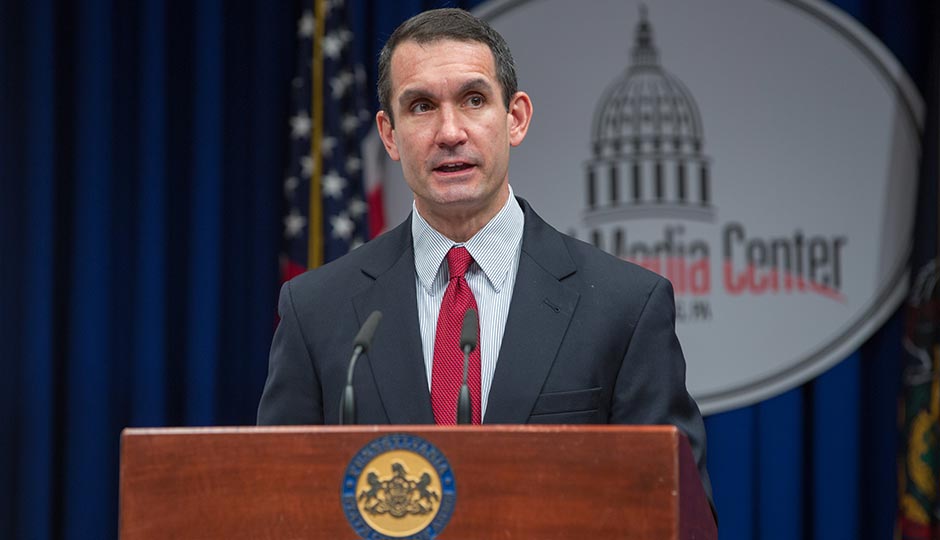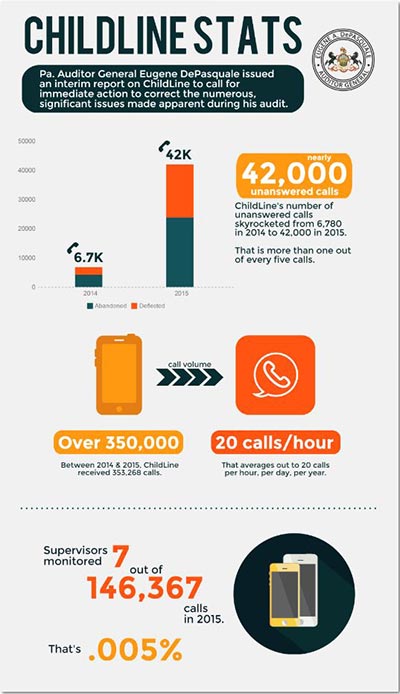Auditor General: 42,000 Unanswered Calls to State Child Abuse Hotline

Eugene DePasquale
A troubling interim report released yesterday by Pennsylvania Auditor General Eugene DePasquale shows that nearly 42,000 calls to Childline, the state hotline for reporting child abuse, went unanswered in 2015. Those calls account for 22 percent of total calls, up from just four percent in 2014.
“Any single one of those calls could have led to a life or death situation for a child,” said DePasquale during a press conference in Harrisburg on Tuesday.

A fact sheet provided with the Auditor General’s interim report.
Childline is a 24-hour call center designed specifically to “provide information, counseling, and referral services for families and children to ensure the safety and well being of the children of Pennsylvania,” according to the Department of Human Services website. Children can call the hotline, as well as anybody who suspects that a child is being abused. The intake specialist who answers the call interviews the caller, and then refers them to the most appropriate resource, including local law enforcement or social services.
In addition to the unanswered calls, the report also found that callers were subjected to longer than normal wait times. The average wait time in October was 6.7 minutes, and the average in November was 5.7. Also, it found that just 7 out of the 146,367 total calls were monitored by a supervisor. Finally, it determined that the center was consistently understaffed, with the minimum level of staff based on availability and minimizing overtime levels instead of expected call volume. According to DePasquale’s report, the 42,000 unanswered calls were either abandoned (the caller hung up while waiting in queue) or deflected (when the call queue is full, subsequent calls are terminated).
Part of the reason for this drastic uptick in volume is a series of laws that increased the number of people needing state-issued clearances from Childline. Now nearly every person who works near children, whether as a volunteer or professional, needs these clearances. These new laws were put in place in December of 2014 after ex-Penn State football coach Jerry Sandusky was found guilty of abusing minors at a football camp he ran. Beginning in July 2015, all adult volunteers “applying for an unpaid position as a volunteer responsible for the welfare of a child or having direct contact with children” needed to obtain a clearance, according to the Pennsylvania State Police website. Caseworkers were tasked with the new responsibility of processing these requests, but not given the additional resources necessary to complete the job, according to DePasquale.
The report lays out several recommendations for the Department of Health and Human Services to implement. These include determining the minimum number of staff required based on expected calls, tracking and documenting all calls made to the hotline, and diverting calls that don’t allege child abuse from case workers so that they can focus on the most urgent calls.
“We did a couple of things right off the bat and that has helped alleviate some of the issues in the audit,” said Secretary of Health and Human Services Theodore Dallas at the same press conference. “There’s always more work to be done, but we think we’re on the right track.”
In a written response to the report, Dallas said that the department increased the number of staff at Childline, increased electronically submitted referrals, and “streamlined” the policies and procedures. These changes have, according to Dallas’ response, resulted in an improved Child Abuse Clearance processing time, and have allowed Childline to maintain a 100 percent timely processing of clearances from May 2015 through February 2015. It also has led to a decrease in the deflected or abandoned call rate, which was down to 12 percent in March 2016.
Read the full report and Dallas’ response below:


